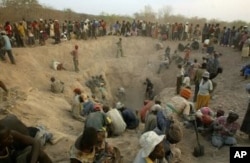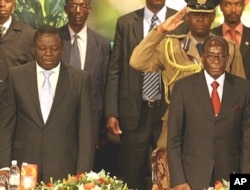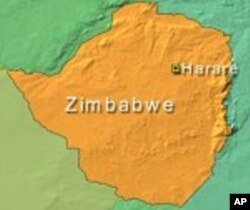Cancellation of Tuesday’s planned auction of rough diamonds from Zimbabwe’s Marange fields could help Prime Minister Morgan Tsvangirai’s government avert suspension from the international Kimberley Process certification scheme.
Evidence of government-led human rights abuse in diamond mining areas, smuggling, and weak internal controls have placed Zimbabwe on a watch list for noncompliance with a Kimberley Process plan of action agreed to by Harare at a meeting last November.
Diamond campaigner Amy Barry of the watchdog group Global Witness says that if today’s auction had gone ahead, Zimbabwe might have lost its bid for Kimberley certification and an untainted opportunity to market its precious minerals worldwide.
“Part of the action plan that was agreed after the Kimberley Process monitoring group visit to Zimbabwe was that they would not export diamonds without prior agreement from the Kimberley Process Scheme. And that obviously didn’t appear to be the case. So for us, it was a signal of a lack of respect for the action plan that had been agreed,” she said.
Global Witness expressed disappointment that Zimbabwean authorities did not reveal their cancellation plans well in advance to Kimberley Process bodies. But human rights groups nonetheless welcomed Thursday’s cancellation by Prime Minister Morgan Tsvangirai as a positive step until it could be confirmed that Zimbabwe is complying with the Kimberley certification process.
The Kimberley Process was set up seven years ago to stop the flow of so-called blood diamonds sold by rebel groups to finance their war operations. International certification was set up to assure consumers that by purchasing diamonds they were not financing war and human rights abuses. In the case of Zimbabwe, Kimberley monitors are hoping to curb mineworker abuse by the country's military, who have been cited for extreme labor practices that allegedly serve the interests of politicallly influential citizens and government officials.
Global Witness advocate Amy Barry says the Harare government needs to work more closely with Kimberley monitors to ensure that meaningful reforms will be implemented.
“It’s imperative that the country as a whole cooperate with the Kimberley Process and with the recommendations of the action plan because if they failed to do so, then they will not be in compliance and therefore, they shouldn’t be exporting all mining diamonds,” she noted.
Barry points out that cleaning up the diamond sector requires Zimbabwe to halt military excesses in which violence is used against local villagers and forced labor. The workers are poorly paid and subject to deteriorating living conditions and demands that they turn over most of their yields to senior government and ZANU-PF officials. The Global Witness observer says that compliance with the Kimberley Process will require Zimbabwe to end these practices.
“If the military is benefitting, then that is not something that we think is in line with the spirit or the letter of the Kimberley Process…and they shouldn’t be considering export or profit for anybody from the diamond industry until they can prove that there are no human rights abuses going on and the areas where the diamonds are found are not under military control,” she contends.
Tuesday’s auction had been scheduled to be conducted by South Africa’s Mbada diamonds company under an agreement with the Zimbabwe government. Amy Barry says that by going ahead with the trading, Zimbabwe most likely would have been in violation of the action plan agreed to at a Kimberley Process meeting last November in Namibia.
“One of the conditions was that the diamonds would not be exported. So in principle, an auction could have taken place and international exporters could have bought their diamonds and kept them within the country. But in that situation then, Zimbabwe would not necessarily have been in breach of the action plan. However, the usual reasons for purchasing governments is to go ahead and sell them. And if international buyers were to be at the auction, which we understand was to be the case, then the logical assumption would be that those diamonds were there to be sold overseas,” she advised.
Kimberley Process monitors have given Zimbabwe six months to curb abuses, ease military restrictions, and improve conditions in Marange for local residents. For now, Zimbabwe’s late-hour cancellation of a questionable mineral sale will give the government some latitude to determine whether or not it truly wants to pursue the international legitimacy it seeks from Kimberley Process ratification so it can openly market its mineral wealth for profit.












